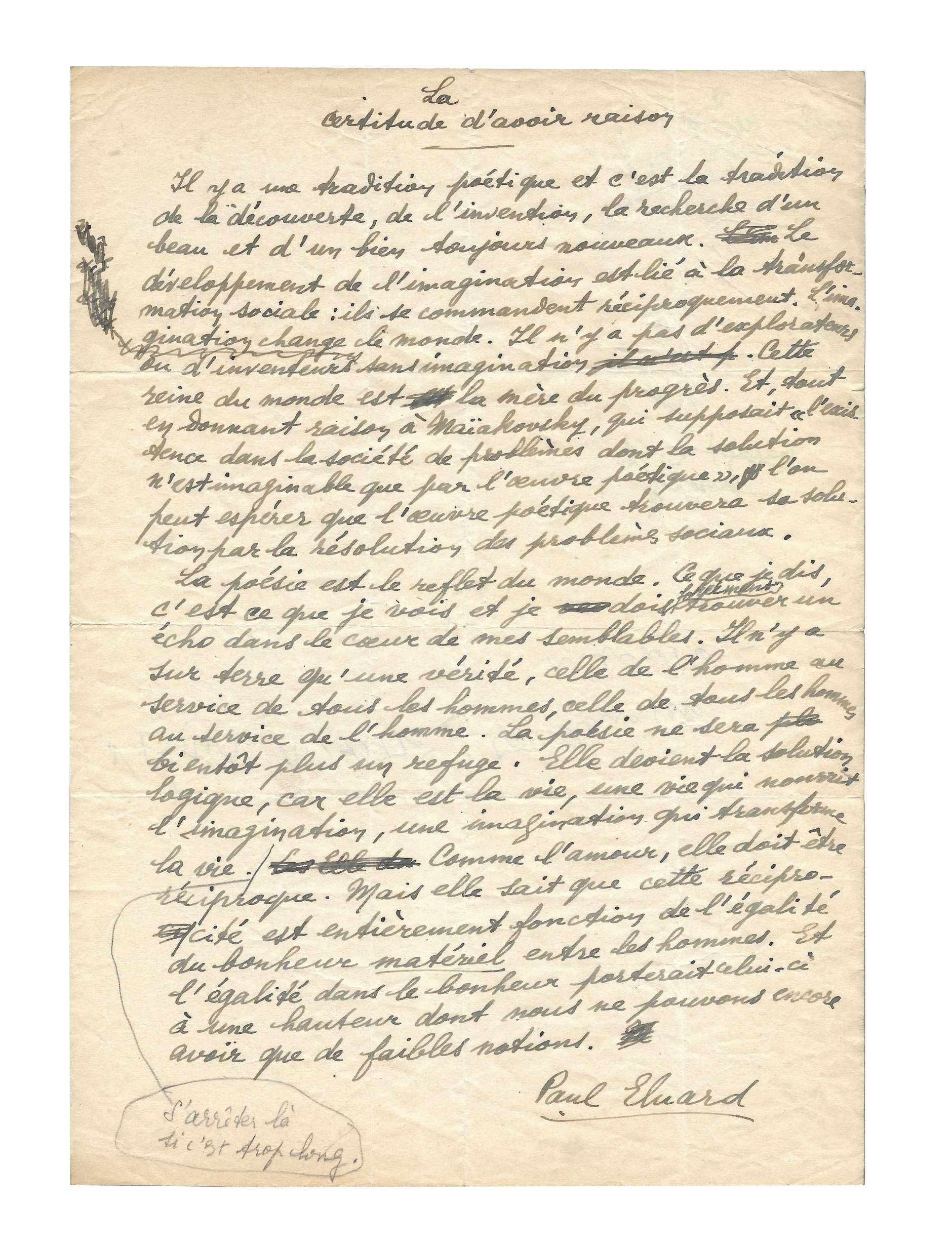ÉLUARD, Paul (1895-1952)
Autograph manuscript signed « Paul Eluard »
N.p.n.d, 1 p. in-4
« Poetry is a reflection of the world. What I say is what I see and I must necessarily find an echo in the hearts of my fellow men »
Fact sheet
ÉLUARD, Paul (1895-1952)
« La Certitude d’avoir raison », autograph manuscript signed « Paul Eluard »
N.p.n.d, 1 p. in-4
Fold marks, paper slightly crumpled, some notes on verso from another hand
Superb first draft manuscript on his vision of poetry: influence on men, influence on the world, influence on the construction of the relationship of men to their world
« Il y a une tradition poétique et c’est la tradition de la découverte, de l’invention, la recherche d’un beau et d’un bien toujours nouveau. Le développement de l’imagination est lié à la transformation sociale : ils se commandent réciproquement. L’imagination change de monde. Il n’y a pas d’explorateurs ou d’inventeurs sans imagination. Cette reine du monde est la mère du progrès. Et, tout en donnant raison à [Vladimir] Maïakovsky, qui supposait l’existence dans la société de problèmes dont la solution n’est imaginable que par l’œuvre poétique », l’on peut espérer que l’œuvre poétique trouvera la solution par la résolution des problèmes sociaux.
La poésie est le reflet du monde. Ce que je dis, c’est ce que je vois et je dois forcément trouver un écho dans le cœur de mes semblables. Il n’y a sur terre qu’une vérité, celle de l’homme au service de tous les hommes, celle de tous les hommes au service de l’homme. La poésie ne sera bientôt plus un refuge. Elle devient la solution logique, car elle est la vie, une vie qui nourrit l’imagination, une imagination qui transforme la vie. Comme l’amour, elle doit être réciproque. Mais elle saut que cette réciprocité est entièrement fonction de l’égalité du bonheur matériel entre les hommes. Et l’égalité dans le bonheur porterait celui-ci à une hauteur dont nous ne pouvons encore avoir que de faibles notions.
Paul Eluard »
This reflection on what poetry is according to Eluard is worth a little overview of the different ways he had to consider this mode of expression: Already before the war, Eluard sees poetry as well as the fruit of an aesthetic, literary and political commitment. With Aragon and Breton, he closely followed the rising ideological conflicts, but refused to let art submit to these problems. It is also the collection Capital de la douleur (1926) that remained the best known of the poet at that time. However, during the Second World War, politics and poetics ended up becoming one under his pen, and his poetry became a weapon in its own right; one naturally thinks of the famous hymn to “Liberté” under the Occupation.
On November 28, 1946, shortly after the probable date of our manuscript, Nusch Eluard, the poet’s wife, died. The latter then renewed his vision of poetry, passing it “from the horizon of one man to the horizon of all”. This desire for universality is superbly expressed here: “What I say is what I see and I must necessarily find an echo in the hearts of my fellow men.” Moreover, the approach to poetry as the common of all stems from a philological reflection on the relationship of men to language, whose conclusion is that “The poet […] will give us back the delights of the purest language as well that of the man of the street as of the wise, as that of the woman, the child or the madman. (Les Sentiers et les routes de la poésie, 1952).
Part of this manuscript, the second and third sentences, can be found in the section Poèmes retrouvés (volume II of the Pléiade p. 873), under the title Aujourd’hui la Poésie: it is a fragment of a lecture given by Eluard, on April 9, 1946, at the French Institute in Prague.
Another part, the last sentence, is found in Avenir de la Poésie (Œuvres complètes, tome I de la Pléiade, p. 526). We know that Eluard made many conferences and declarations in Prague during the spring of 1946, then Italy and Greece. One can legitimately think that this manuscript dates from this time.
Lucien Scheler does not mention this text either in the alphabetical index of the periodicals that published Eluard or in the chronological index. Still, chances are he knew the text, at least by a typed copy. The signature and the pencil endorsement seem to indicate a publication.
